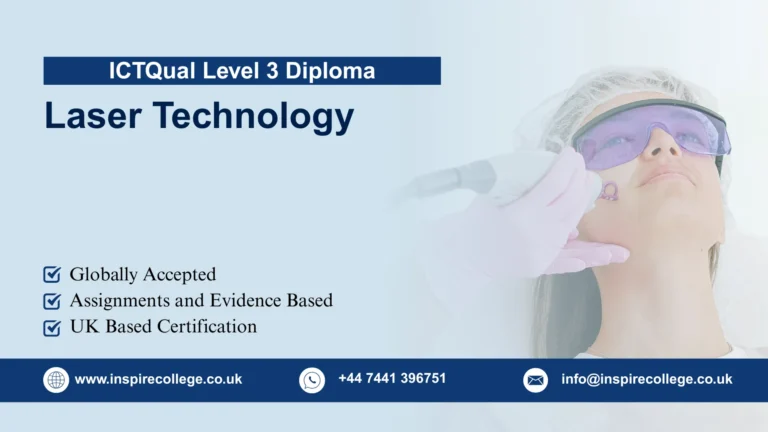
ICTQual Level 6 Diploma in Automotive Engineering 360 Credits – Three Years
The ICTQual Level 6 Diploma in Automotive Engineering is a comprehensive program designed to equip learners with advanced knowledge and practical skills in the dynamic automotive industry. With rapid advancements in electric vehicles, autonomous systems, and smart mobility solutions, automotive engineering has become a critical field for technological innovation and industrial growth. This diploma is ideal for both freshers and professionals seeking to enhance their expertise and career prospects in automotive design, manufacturing, and maintenance.
Spanning three years and carrying 360 credits, the program provides a structured pathway to mastering core and advanced concepts in automotive engineering, including vehicle design, powertrain systems, automotive electronics, hybrid and electric vehicle technologies, diagnostics, and automotive safety systems. Learners gain a strong foundation in engineering principles, problem-solving, and technical analysis, preparing them to address real-world challenges in vehicle design, production, and service.
The curriculum emphasizes practical application alongside theoretical knowledge. Students engage in hands-on laboratory work, simulations, software-based vehicle modeling, and industry-oriented projects. These experiences ensure learners can design, analyze, and optimize automotive systems efficiently and safely. Additionally, the program covers project management, quality assurance, and professional ethics, enabling graduates to work confidently in multidisciplinary teams and leadership roles.
By completing the ICTQual Level 6 Diploma in Automotive Engineering, learners achieve a globally recognized qualification that opens doors to advanced career opportunities, specialized technical roles, and higher education pathways. Graduates will emerge as skilled, innovative, and adaptable automotive engineers, ready to contribute effectively to the automotive industry and cutting-edge technological developments worldwide.
The ICTQual Level 6 Diploma in Automotive Engineering is designed to ensure learners possess the foundational knowledge, skills, and competencies needed to succeed in this advanced program. Meeting the entry requirements prepares learners to engage fully with both theoretical concepts and practical applications in automotive engineering.
Age Requirements
- Applicants must be at least 18 years old at the time of enrolment.
Educational Requirements
- Completion of a Level 5 or equivalent diploma in Automotive Engineering, Mechanical Engineering, or related technical fields.
- Strong background in mathematics, physics, and engineering principles is recommended.
- Fresh graduates should have completed secondary education (A-levels, high school diploma, or equivalent) with STEM-related subjects.
Professional Experience
- Professionals with 2–3 years of verifiable experience in automotive engineering, vehicle maintenance, or related industries may be eligible for direct enrolment.
- Practical experience in automotive systems, manufacturing, or electronics is advantageous but not mandatory for fresh learners.
English Language Proficiency
- Applicants whose first language is not English must demonstrate proficiency through recognized tests such as IELTS (minimum 5.5 overall), TOEFL, or equivalent.
- Competency in technical reading, writing, and communication in English is essential for successful course completion.
By meeting these entry requirements, learners will be well-prepared to engage with the ICTQual Level 6 Diploma in Automotive Engineering, develop advanced technical and practical skills, and pursue rewarding career opportunities in the global automotive industry.
Mandatory Units
This qualification, the ICTQual Level 6 Diploma in Automotive Engineering 360 Credits – Three Years– Three Years, consists of 36 mandatory units.
Year 1: Foundation and Core Engineering Principles
- Introduction to Automotive Engineering
- Mathematics for Automotive Engineering
- Physics for Automotive Engineering
- Mechanical Engineering Principles
- Automotive Systems and Technology
- Electrical and Electronic Systems in Vehicles
- Engineering Materials for Automotive Design
- Vehicle Chassis and Suspension Systems
- Introduction to Vehicle Diagnostics
- Manufacturing Processes for Automotive Engineering
- Automotive Environmental Issues
- Health, Safety, and Environmental Management
Year 2: Advanced Automotive Technologies and Systems
- Advanced Engine Technologies
- Vehicle Dynamics and Handling
- Advanced Automotive Electronics
- Transmission and Powertrain Systems
- Vehicle HVAC Systems
- Vehicle Safety Systems
- Hybrid and Electric Vehicle Technologies
- Automotive Aerodynamics
- Automotive Materials Engineering
- Vehicle Assembly and Production Techniques
- Automotive Diagnostics and Troubleshooting
- Vehicle Testing and Performance Evaluation
Year 3: Industry Applications, Management, and Innovation
- Advanced Vehicle Design and Prototyping
- Automotive Control Systems
- Automotive Quality Control and Assurance
- Sustainability in Automotive Engineering
- Automotive Project Management
- Automotive Research and Development
- Vehicle Electromagnetic Compatibility
- Automotive Business and Marketing
- Autonomous Vehicles and Future Technologies
- Vehicle Fleet Management and Operations
- Automotive Regulatory Compliance and Standards
- Capstone Project in Automotive Engineering
The ICTQual Level 6 Diploma in Automotive Engineering is designed to develop learners into highly skilled, innovative, and competent automotive engineers. Over three years, students acquire advanced knowledge, practical expertise, and professional competencies, preparing them for diverse roles in automotive design, manufacturing, diagnostics, and management.
Year 1: Foundation and Core Engineering Principles
Introduction to Automotive Engineering
- Understand the fundamentals of automotive engineering and vehicle systems.
- Identify key components and technologies in modern vehicles.
- Apply basic automotive principles to simple design and analysis tasks.
- Evaluate industry trends and their impact on automotive development.
Mathematics for Automotive Engineering
- Apply mathematical tools such as algebra, calculus, and statistics to automotive problems.
- Solve engineering equations relevant to vehicle dynamics and systems.
- Use mathematics to model and analyze automotive components.
- Interpret results to support design and optimization tasks.
Physics for Automotive Engineering
- Understand core physical principles relevant to vehicle systems.
- Apply mechanics, thermodynamics, and fluid dynamics to automotive problems.
- Conduct experiments to validate theoretical concepts.
- Evaluate physical phenomena impacting vehicle performance.
Mechanical Engineering Principles
- Apply mechanical principles to analyze forces, moments, and energy in automotive systems.
- Understand stress, strain, and material behavior in components.
- Design simple mechanical systems and evaluate functionality.
- Conduct calculations for vehicle components using engineering standards.
Automotive Systems and Technology
- Understand major automotive systems including engines, transmission, and brakes.
- Analyze system interactions and performance criteria.
- Apply knowledge to basic vehicle design and diagnostics tasks.
- Evaluate emerging technologies and innovations in automotive engineering.
Electrical and Electronic Systems in Vehicles
- Understand electrical and electronic principles for automotive applications.
- Analyze vehicle electrical circuits and control systems.
- Apply skills to diagnose and troubleshoot basic automotive electronics.
- Conduct practical exercises with sensors, actuators, and vehicle modules.
Engineering Materials for Automotive Design
- Identify materials used in automotive components and their properties.
- Analyze material behavior under operational conditions.
- Select appropriate materials for specific automotive applications.
- Apply knowledge in practical design and manufacturing scenarios.
Vehicle Chassis and Suspension Systems
- Understand chassis design principles and suspension system types.
- Analyze vehicle stability, handling, and load distribution.
- Apply design principles in laboratory or simulation projects.
- Evaluate system performance under different operational conditions.
Introduction to Vehicle Diagnostics
- Understand diagnostic tools and procedures for automotive systems.
- Apply basic fault-finding techniques using diagnostic software and instruments.
- Analyze vehicle system data to identify issues.
- Develop problem-solving approaches for real-world scenarios.
Manufacturing Processes for Automotive Engineering
- Understand production techniques for automotive components and assemblies.
- Apply knowledge of machining, forming, and assembly processes.
- Evaluate process efficiency, quality, and cost considerations.
- Conduct practical exercises simulating production scenarios.
Automotive Environmental Issues
- Understand environmental impacts of vehicles including emissions and resource usage.
- Apply strategies for reducing environmental footprint.
- Evaluate regulatory and sustainability requirements in automotive engineering.
- Analyze case studies on eco-friendly automotive technologies.
Health, Safety, and Environmental Management
- Apply health and safety principles in automotive engineering settings.
- Understand workplace regulations and standards.
- Implement safe practices in workshops and laboratories.
- Evaluate risk assessments and compliance measures.
Year 2: Advanced Automotive Technologies and Systems
Advanced Engine Technologies
- Understand advanced combustion, fuel injection, and turbocharging technologies.
- Analyze engine performance, efficiency, and emissions.
- Apply diagnostic techniques to engine systems.
- Evaluate emerging propulsion technologies including alternative fuels.
Vehicle Dynamics and Handling
- Analyze vehicle motion, stability, and control characteristics.
- Apply dynamic models to predict handling behavior.
- Conduct practical tests or simulations to evaluate performance.
- Optimize suspension and steering systems for performance and safety.
Advanced Automotive Electronics
- Understand electronic control units (ECUs) and embedded systems.
- Apply electronics to engine management, infotainment, and safety systems.
- Conduct diagnostics and troubleshooting for advanced vehicle electronics.
- Evaluate system performance and reliability.
Transmission and Powertrain Systems
- Analyze manual, automatic, and hybrid transmission systems.
- Understand drivetrain configurations and torque distribution.
- Apply calculations and simulations to optimize performance.
- Conduct practical exercises on assembly and troubleshooting.
Vehicle HVAC Systems
- Understand heating, ventilation, and air conditioning systems.
- Analyze system performance and energy efficiency.
- Apply practical skills for HVAC diagnostics and maintenance.
- Evaluate innovative climate control solutions for modern vehicles.
Vehicle Safety Systems
- Understand active and passive safety technologies including airbags, ABS, and traction control.
- Analyze crashworthiness and system effectiveness.
- Apply diagnostic and testing procedures for safety components.
- Evaluate integration of safety systems in vehicle design.
Hybrid and Electric Vehicle Technologies
- Understand electric and hybrid powertrain principles.
- Analyze battery systems, energy management, and regenerative braking.
- Apply diagnostic tools for EV and hybrid systems.
- Evaluate emerging trends in electric mobility.
Automotive Aerodynamics
- Understand principles of airflow and drag reduction.
- Apply aerodynamic analysis to vehicle design.
- Conduct simulations or wind tunnel experiments.
- Evaluate impact of aerodynamics on fuel efficiency and performance.
Automotive Materials Engineering
- Analyze lightweight materials, composites, and alloys for vehicles.
- Apply material selection strategies for performance and sustainability.
- Conduct practical tests on material properties.
- Evaluate material innovations for next-generation vehicles.
Vehicle Assembly and Production Techniques
- Understand assembly line design, robotics, and manufacturing automation.
- Apply lean manufacturing and quality control principles.
- Conduct practical exercises simulating production processes.
- Evaluate production efficiency and system reliability.
Automotive Diagnostics and Troubleshooting
- Apply advanced diagnostic procedures for complex systems.
- Interpret data from sensors, ECUs, and diagnostic tools.
- Develop systematic problem-solving strategies.
- Conduct hands-on troubleshooting exercises.
Vehicle Testing and Performance Evaluation
- Understand testing protocols for engines, chassis, and vehicle systems.
- Apply measurement and analysis techniques to evaluate performance.
- Conduct practical vehicle testing under controlled conditions.
- Evaluate results to recommend improvements or modifications.
Year 3: Industry Applications, Management, and Innovation
Advanced Vehicle Design and Prototyping
- Apply CAD/CAE tools for vehicle design and simulation.
- Develop prototypes for evaluation and testing.
- Analyze design efficiency, safety, and performance.
- Conduct practical projects integrating multiple vehicle systems.
Automotive Control Systems
- Understand control theory applications in vehicles.
- Apply control strategies for engine, braking, and stability systems.
- Conduct simulations to optimize system performance.
- Evaluate integration of control systems in real vehicles.
Automotive Quality Control and Assurance
- Apply quality management systems in automotive production.
- Conduct inspections, testing, and compliance evaluations.
- Analyze defects and implement corrective measures.
- Evaluate continuous improvement strategies for manufacturing.
Sustainability in Automotive Engineering
- Understand environmental regulations and sustainability practices.
- Apply green engineering solutions to vehicle design and production.
- Evaluate life-cycle impact of automotive components.
- Develop strategies for sustainable mobility solutions.
Automotive Project Management
- Plan and manage automotive engineering projects effectively.
- Apply scheduling, budgeting, and resource allocation principles.
- Evaluate project risks and quality standards.
- Develop professional leadership and team management skills.
Automotive Research and Development
- Conduct systematic R&D for automotive innovation.
- Apply experimental design and testing methods.
- Analyze results to inform vehicle design improvements.
- Evaluate emerging technologies and their market impact.
Vehicle Electromagnetic Compatibility
- Understand EMI/EMC principles in automotive systems.
- Conduct practical testing to ensure compliance.
- Apply mitigation strategies for electromagnetic interference.
- Evaluate system performance under real-world conditions.
Automotive Business and Marketing
- Understand automotive industry economics and market trends.
- Apply marketing strategies for vehicles and technologies.
- Evaluate business models and product positioning.
- Analyze industry case studies for strategic decision-making.
Autonomous Vehicles and Future Technologies
- Understand autonomous vehicle architectures and sensor systems.
- Analyze algorithms for navigation, perception, and control.
- Apply simulation and testing techniques for autonomous systems.
- Evaluate trends and ethical considerations for future mobility.
Vehicle Fleet Management and Operations
- Apply principles of fleet planning, monitoring, and maintenance.
- Analyze operational efficiency and cost management.
- Implement data-driven strategies for fleet optimization.
- Evaluate sustainability and regulatory compliance for fleets.
Automotive Regulatory Compliance and Standards
- Understand international vehicle regulations and standards.
- Apply compliance procedures in design and manufacturing.
- Conduct audits and inspections for regulatory adherence.
- Evaluate impact of standards on product development and innovation.
Capstone Project in Automotive Engineering
- Plan and execute a comprehensive automotive engineering project.
- Apply theoretical knowledge and practical skills to real-world problems.
- Demonstrate problem-solving, design, and project management capabilities.
- Present and defend project outcomes professionally.
Upon completing all units, learners will possess advanced automotive engineering knowledge, practical technical expertise, and professional competencies. Graduates are prepared to excel in vehicle design, manufacturing, diagnostics, electric and autonomous vehicle technologies, project management, and leadership roles in the global automotive industry.
The ICTQual Level 6 Diploma in Automotive Engineering is designed for learners who are passionate about vehicles, innovation, and practical engineering solutions. This program is suitable for both freshers and professionals seeking advanced knowledge and hands-on experience in the automotive sector.
Fresh Graduates and STEM Students
- Individuals who have completed secondary education, A-levels, or a Level 5 diploma in Automotive Engineering, Mechanical Engineering, or related fields.
- Learners seeking a structured and comprehensive pathway to acquire advanced automotive engineering knowledge.
Early-Career Automotive Professionals
- Professionals with 2–3 years of experience in vehicle maintenance, automotive design, or manufacturing.
- Those aiming to enhance technical expertise, project management skills, and career advancement opportunities.
Hands-On and Application-Oriented Learners
- Individuals interested in practical exercises, laboratory work, simulations, and real-world automotive projects.
- Learners who want to apply theoretical knowledge to vehicle diagnostics, assembly, and design tasks.
Innovation and Technology Enthusiasts
- Learners committed to understanding emerging automotive technologies such as electric and hybrid vehicles, autonomous systems, and smart mobility solutions.
- Those aiming to integrate innovative solutions into automotive systems and product development.
Aspiring Leaders and Automotive Specialists
- Candidates seeking leadership roles, project management positions, or specialized technical expertise in automotive organizations.
- Learners interested in research, entrepreneurship, or regulatory and compliance aspects of the automotive industry.
This diploma program equips learners with the knowledge, practical skills, and professional competencies necessary to excel as innovative and globally competitive automotive engineers, prepared for diverse career opportunities in the automotive industry.
We are an approved centre of ICTQual AB, and all learners must enrol with us to pursue the ICTQual Level 6 Diploma in Automotive Engineering. This program offers tailored certification routes for both experienced professionals and fresh candidates, ensuring flexibility and recognition of prior experience.
Route for Experienced Professionals
- Applicants must have at least 6 years of verifiable experience in automotive engineering, vehicle maintenance, or related technical fields
- Submit a portfolio demonstrating relevant professional achievements and project experience
- Attend an orientation to understand course structure, assessment methods, and certification requirements
- Complete a targeted set of assignments and practical evaluations that leverage existing expertise
- Participate in industry-based assessments or project evaluations as required
- Upon successful completion, receive the ICTQual Level 6 Diploma in Automotive Engineering
Route for Fresh Candidates
- Fresh learners or those without extensive professional experience must enrol and complete all 36 course assignments
- Attend lectures, laboratory sessions, and practical workshops throughout the three-year program
- Complete projects, case studies, and technical exercises to develop both theoretical and practical competencies
- Undergo continuous assessments, examinations, and practical evaluations during the program
- Submit a capstone project demonstrating comprehensive understanding and application of automotive engineering concepts
- Receive the ICTQual Level 6 Diploma in Automotive Engineering upon successful completion
Both certification routes provide learners with a globally recognized qualification that equips them with advanced technical, practical, and managerial skills. Graduates gain expertise in areas such as vehicle design, engine technologies, hybrid and electric systems, diagnostics, assembly and manufacturing, project management, and sustainable automotive engineering, preparing them for specialized roles and leadership positions in the global automotive industry.
Register Now
FAQs for ICTQual Level 6 Diploma in Automotive Engineering






